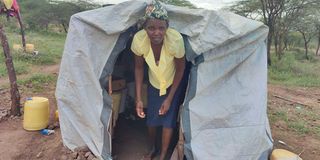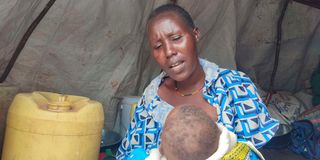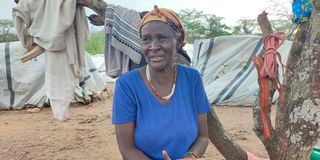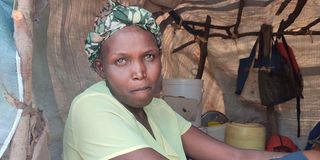Baringo mothers' heart-breaking return home

Monica Chepkok who has been forced to put up in a temporary tent with her five children in Kagir village in Baringo North. All her livestock, which was their main source of livelihood, were driven away by raiders in 2020, rendering them paupers.
What you need to know:
- Six months after fleeing bandit attacks in Baringo North, returning mothers have found their homes vandalised and possessions looted, forcing them to live in the same tattered tents they used in displacement camps - now pitched on their own destroyed homesteads.
- In these makeshift shelters, nursing mothers struggle to produce milk due to malnutrition while their children survive on watery porridge, marking a cruel transition from once-prosperous livestock owners to aid-dependent families surviving on one meal a day.
The weak cries of a hungry infant pierce the afternoon silence. Inside a cramped tent where the temperature soars past uncomfortable, Priscah Taramakow stirs a thin porridge – the only meal her three-month-old baby will taste today.
"They told us it was safe to return home," Priscah whispers.
The tent she lives in, barely large enough to shelter her and her seven children, stands on what was once her homestead in Kagir village, Baringo North. The cruel irony isn't lost on her – she's using the same makeshift shelter from her displacement camp, now pitched on her own land.
Outside, a cold fireplace sits empty, its ashes undisturbed. At this hour, smoke should be rising from cooking pots preparing lunch, but today, like many days before, there is nothing to cook.
Throughout the settlement, malnutrition stalks the children like an invisible predator. The notion of three meals a day feels like a distant dream here – most families survive on a single meal of rice and beans, if they're fortunate enough to receive it. More often, it's just porridge, stretched thin to quiet hungry stomachs. After the violent flare-ups that stripped these families of their livelihoods, they've become entirely dependent on food aid – assistance that arrives sporadically, if at all.
What makes their situation even more bitter is that these families are not in some distant refugee camp – they're living in tents on their own land. When the government declared it safe to return to Baringo North in May, they came back to find their homes vandalized and belongings looted. Now, they use the same makeshift shelters from their displacement camps, pitched on the very ground where their houses once stood.
The ongoing nightmare began unfolding in January when hundreds of residents fled their homes in the insecurity-prone Saimo Soi and Bartabwa wards of Baringo North, driven out by relentless bandit attacks. They scattered to safety, many seeking refuge in temporary tents in Moinonin, while others fled further to Marigat, Mogotio, Chebarsiat and other distant areas.
In May, when the government declared the area safe and began repatriating the displaced families, they returned to find their villages stripped bare. During their absence, armed attackers had invaded their deserted homes, systematically looting belongings and vandalising structures. Now, the returnees – predominantly women and children from Kagir, Kosile, Ng'aratuko, Chepkewel, and Kapsebeiwa – find themselves living in the same tattered tents they used during their displacement, pitched on the very land where their homes once stood.

The devastation extends beyond individual families. The acrid smell of smoke still lingers in the air around Kagir shopping centre, once a bustling hub where neighbouring communities would gather for barter trade, now echoes with emptiness. Now, only the crunch of broken glass under feet breaks the eerie silence. Shards of soda bottles glint in the harsh afternoon sun, scattered across the dusty floors of vandalised mud-walled shops – silent witnesses to the violence that drove residents from their homes.
"I came back to Kagir village with a few other villagers in June after the national government assured us that normalcy had returned in the banditry prone area," Priscah explains, her voice barely rising above a whisper.
The government's promise of "normalcy" rings hollow for the women who have returned. Their stories reveal a calculated pattern of destruction designed to prevent their return.
"We were ferried with our children using police trucks. True to their word, calm is slowly returning to the area, but the greatest challenge here is that we have nowhere to live – most of our houses were vandalised by the criminals who took over after we fled."
The tent she now calls home is painfully familiar – it's the same one that sheltered her family during their months of displacement in Moinonin.
"I gave birth to my baby at the refugee camp," she adds, adjusting the thin blanket wrapped around her infant. "My breasts no longer produce enough milk because of lack of food, forcing me to feed my baby on porridge at least for survival."
Her voice catches as she recounts her losses: "I lost all my more than 100 goats, which I was relying on to get milk and selling to get money. They were driven away by the raiders. I have been left a pauper, relying on well-wishers to feed and clothe."
She pauses to take a sip from a plastic jug beside her, the water a precious commodity in these harsh conditions.
While Priscah struggles to feed their children, her husband has found work tending to a neighbour’s surviving goats in distant pastures. The separation adds another layer of hardship to their already fragile existence, but it's their only option for earning even a meagre income.
"Apart from food, I sleep in this shanty tent with my seven children, despite the rains. We have been forced to brave the cold because we have no other choice," she continues.
"I appeal to the government to at least build us some houses because we don't have money to buy food, let alone building materials after all our entire livelihood was wiped by the attackers."
The story of repeated displacement weighs heavily on her words: "The incessant attacks over the years has led me to flee the village to other safer areas more than five times since 2012."
While Priscah's story is heart-breaking, she is not alone in her suffering. A few tents away, Monica Chepkok, 32, shares a similarly heart-breaking tale. The young widow's face bears the weight of her struggles as she describes how her life changed forever when her husband, Samuel Chepkok, was killed.
As a boda boda rider, he had been their family's breadwinner, navigating the dangerous Kagir-Loyamorok road to provide for his wife and children. One day, the dangers caught up with him.
"He died when my fifth child was barely a month old, and I was too weak to even engage in menial work," Monica recalls, her fingers nervously playing with the hem of her dress. "I was forced to relocate from where we used to live together because it was deserted and was not safe for me and my five children."

Margaret Adoket from the insecurity prone Kagir village in Baringo North lost her husband after he was killed by bandits in 2018. The bandits also made away with their more than 50 goats.
The recent return to Kagir brought fresh pain: "When we came back to Kagir village recently after normalcy returned after the recent displacement, I was shocked to find my house vandalised, forcing us to erect the same tents we used earlier in Moinonin where we used to squat. The situation is dire because we have nothing to eat, no livestock to sell or any menial job to engage in as every villager is affected."
Her voice trembles with uncertainty: "I do not know what the future holds for me and the children after my husband died. The same criminals who killed our husbands are still baying for our blood. I have fled the village more than five times due to the spate of attacks. As we speak, we still take the little rice we were given as food aid, which is almost getting depleted."
The February 2024, attacks left them with nothing but the clothes on their backs.
"The government should come to our rescue because we are living in a very sorry state, yet we used to have property and provide for our children," Monica pleads.
"When I fled, I didn't manage to take anything from the house because during the attack, criminals shot at us indiscriminately and the first thought was just to run to safety...the bandits carted away all what we had left out and demolished our homes."
The impact on her children's education is devastating: "For four months we sought refuge at a safer village, my children were out of school. When we went back to the village in May, they went back to Kagir Primary School, but under difficult circumstances because the only clothes they have is the school uniform, which they put on while at home and at school as well. They sometimes go to school on empty stomachs."
Access to healthcare adds another layer of hardship: "Getting medication here is a nightmare. We normally go for medication at the neighbouring Yatya dispensary, close to three kilometres away but there are hardly any drugs and our safety is also not guaranteed. When there is an emergency, we are forced to seek health services at Marigat Sub-County hospital, dozens of kilometres away, which you also have to part with Sh3,000 for boda boda transport because there are no public vehicles plying the area due to insecurity."
The pattern of loss and displacement repeats itself across the settlement, each story more devastating than the last. Margaret Adoket's story adds to this tapestry of loss and survival. The pain in her eyes is still fresh as she recounts how her husband, Adoket Dike, was killed by bandits in 2018 while herding livestock in the neighbouring Barsuswo village.
"Not only did I lose my husband but also lost our entire livelihood, leaving me to fend for my eight children, despite being jobless," she says, her voice heavy with grief.
Deserted village
"On the fateful day, the bandits struck the village and laid ambush on men who were herding. Dike, my husband, ended up being a casualty. He died on the spot while others managed to escape unhurt. The raiders didn't just take his life - they drove away more than 50 goats, our entire herd, leaving us with nothing to survive on. The attack led to mass exodus of people from the area to the neighbouring Kagir, 10km away. To date, the village is still deserted owing to the spate of attacks and we are on the move every time the attacks erupt."
The aftermath of displacement brought further devastation: "When the villagers fled the area, the criminals vandalised and torched houses so that the owners would not come back anymore. I lost everything to the extent of lacking what to eat. My nine children whom I was forced to provide for alone, slept without food for days, not to mention lacking where to sleep because the entire village was displaced and all of us could not be accommodated in houses in the neighbouring village. We slept under trees for some time despite the presence of criminals."

Monica Chepkok sits inside her temporary tent.
The violence has left an indelible mark on the landscape itself. A nearby hill, grimly nicknamed 'Kismayu' after the war-torn Somali city, stands as a silent sentinel to past bloodshed. In 2006, it witnessed a day-long battle between Pokot and Tugen communities, resulting in multiple deaths and the loss of hundreds of livestock. Today, it serves as a strategic vantage point for bandits surveying potential targets.
The scale of displacement is staggering. In the attacks early this year alone, more than 10,000 people were forced from their homes. The most affected areas – Barketiew, Loruk, Sibilo, and Rondinin sub-locations – now stand desolate, along with Ng'aratuko, Kosile, Chepkewel, Kapsebeiwa, Naiben, Koibaisa, Nyalilbuch, Kapsoi, Chelelyo, Kiplelchony and other villages.
Despite the scale of destruction, official responses have failed to address the fundamental challenge – these women can't rebuild homes that no longer exist.
Saimo-Soi Ward MCA Michael Chebon paints a grim picture of the ongoing crisis: "Since I was elected, I have buried more than 20 people in my ward, shot dead by armed criminals while tens of others are still nursing gunshot wounds. Almost all villages in my ward are deserted courtesy of the bandit attacks after the inhabitants fled to the safer Kipsaraman, Kabartonjo, Chebarsiat, Kasisit, Kipcherere, Kimalel, Mogotio Marigat and other areas dozens of kilometres away."
The plight of returnees particularly concerns him: "Women and children are living in squalor, forced to sleep in temporary tents after their houses were vandalised and some torched by armed attackers. We have tried to seek assistance from humanitarian agencies, the county and the central government to help the locals rebuild their lives but nothing tangible has been achieved."
While food aid occasionally arrives from the county and national government, it's insufficient for the massive need: "The locals need to be assisted by the government to stand on their feet because they are depending on well-wishers for everything after they were rendered paupers by the attackers who stole all their livestock, which was their main source of livelihood. Families cannot afford even a single meal, let alone paying school fees for their children."
Baringo County Commissioner Stephen Kutwa offers a different perspective on the situation: "The locals have fear of the unknown and that is why they resorted to live communally in temporary tents for their own safety and near to a security camp, but they will go to their houses once they are assured of their safety."
Devolved unit
He notes the government's efforts to provide support: "When we repatriated the displaced locals, the state provided them with food that could last for three months. The humanitarian agencies, devolved unit and faith-based organisations also chipped in to provide food and non-food items to the affected people. We received some food last week and we will take it to the affected locals any time from now."
Yet for women like Priscah, Monica, and Margaret, these official assurances and sporadic aid deliveries barely scratch the surface of their daily struggles.
As the sun sets over their makeshift settlement, casting long shadows across the abandoned buildings of Kagir, women like Priscah, Monica, and Margaret continue their daily struggle to protect and provide for their children. Their current reality – living in tents on their own land – represents a cruel twist in their displacement saga. Their stories, marked by unimaginable loss and incredible resilience, reflect a crisis that has stripped away not just their possessions, but the very possibility of return.
In the growing darkness, the sound of children's voices carries across what were once thriving homesteads – a reminder that despite everything, life continues. These mothers watch over their young ones in flimsy tents, their dreams of rebuilding as fragile as the temporary shelters they call home, waiting for the day when peace will finally return to their troubled land.



